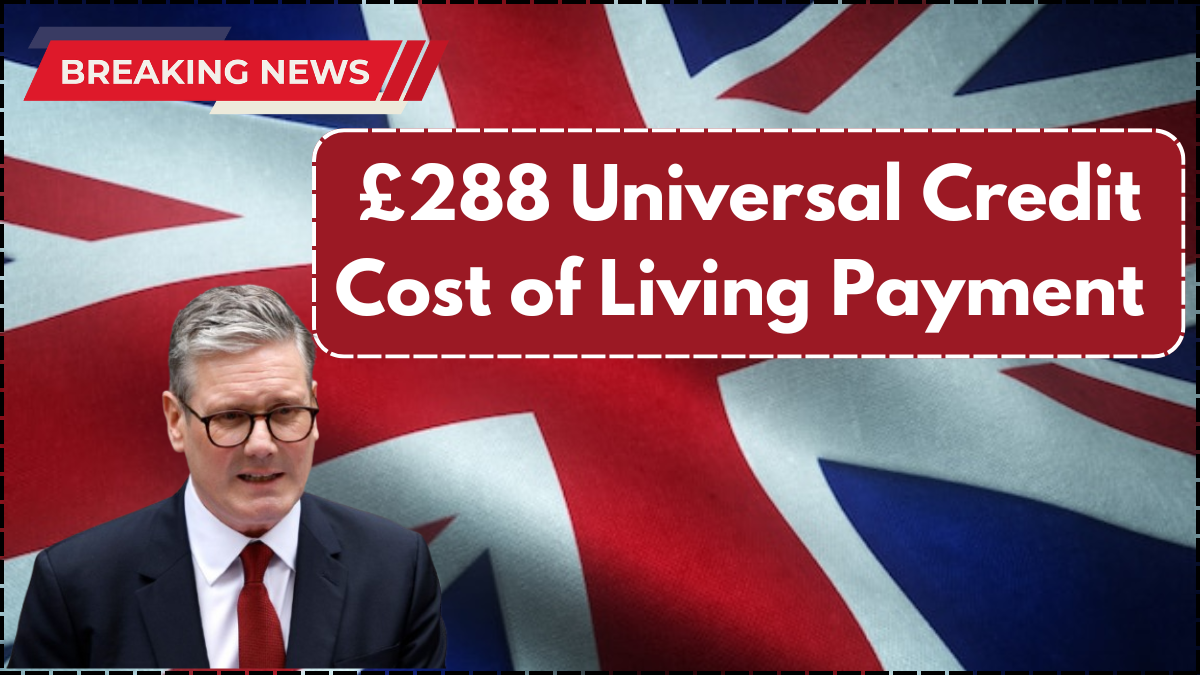As winter approaches and living expenses continue to rise, many UK residents are anticipating financial support through the £288 Universal Credit Cost of Living Payment. This initiative aims to help individuals and families struggling with inflation and economic uncertainties. Here’s everything you need to know about this payment, including eligibility criteria, payment details, and upcoming changes in 2025.

Understanding the £288 Cost of Living Payment
The UK government has introduced various financial aid programs to mitigate the impact of rising living costs. Among them is the £288 Cost of Living Payment, designed to provide relief to low-income households and individuals relying on Universal Credit and other benefits.
Eligibility Criteria
To qualify for the £288 payment, individuals must meet the following conditions:
- Income Cap: Household income should not exceed £16,000.
- Benefit Recipients: Those receiving Universal Credit, Pension Credit, Income Support, or related benefits are eligible.
- Residency Requirement: Applicants must be permanent residents of the UK.
Payment Details
- First Instalment: The initial payment of £308 was released in the previous year, benefiting over 18 million households.
- Upcoming Payment: The second instalment, set at £288, is expected to be disbursed soon.
- Payment Identification:
- DWP Payments: The Department for Work and Pensions (DWP) will process payments labeled as “DWP COL.”
- HMRC Payments: Payments from HM Revenue and Customs (HMRC) will carry the code “HMRC COL.”
Also Read: UK Government Offering £150 Free Vouchers for UK Families- Who’s Eligible & How to Claim
Universal Credit Enhancements for 2025
As part of the government’s commitment to supporting low-income citizens, several updates will be implemented in 2025, enhancing Universal Credit and related benefits.
Increased Support and Allowances
- Higher Universal Credit Rates: Adjustments will be made to accommodate inflation, ensuring better financial aid for struggling families.
- Additional Disability Support: A supplement of £150 will be allocated to individuals with disabilities.
- Pensioner Allowance Increase: Pensioners will receive an extra £300 to help manage living expenses.
- Winter Fuel Assistance: Retired individuals will receive an additional heating allowance to cope with winter energy costs.
Payment Schedule for 2025
- Total Benefit Amount: The financial support package will increase to £900, distributed in three instalments throughout the year.
- Additional Supplements: Eligible applicants will also receive Personal Independence Payments (PIP) and Attendance Allowance.
History and Expansion of Universal Credit Funds
Over the years, the Universal Credit system has evolved to provide more substantial financial support to UK citizens. Here’s a look at its funding and impact:
Fund Allocation and Growth
- Initial Funding: The program was launched with an £8.8 million fund, which expanded to £15.2 million by May 2022.
- Beneficiaries: Between 8.1 to 8.5 million citizens applied for assistance, with over 6.3 million disabled individuals receiving financial aid.
- Recent Increases: For 2025, government funding has grown to £7.5 billion, with a 6.5% increase in claims based on CPI data.
- Disability Benefits Expansion: A budget of £1.1 billion has been set aside to enhance support for disabled individuals.
- Winter Fuel Support: An additional £8.8 million has been allocated to assist pensioners with heating expenses.
Upcoming Universal Credit Policy Changes in 2025
New Adjustments to Deductions and Allowances
- Reduction in Universal Credit Deductions: Starting April 2025, the maximum deduction from Universal Credit payments will be lowered from 25% to 15% of the standard allowance.
- Carer’s Allowance Increase: The weekly earnings threshold for Carer’s Allowance will rise from £151 to £181.
- Household Support Fund Extension: The government has extended this fund until March 2026, providing essential assistance to vulnerable households.
- Benefit and Pension Adjustments: Various benefits, including maternity pay, paternity pay, adoption pay, and sick pay, will see increases for the 2025-2026 fiscal year.
Also Read: UK Households Have Just 24 Hours Left to Claim Cost of Living Help Worth £1,000
Frequently Asked Questions (FAQs)
1. Who qualifies for the £288 Cost of Living Payment?
Individuals earning less than £16,000 annually, including Universal Credit and Pension Credit recipients, are eligible.
2. How will I receive the payment?
The payment will be deposited directly into the registered bank account, with identifiers “DWP COL” for DWP payments and “HMRC COL” for HMRC transactions.
3. When is the £288 payment expected?
Although an official date has not been confirmed, the payment is anticipated within the coming months. Applicants should check government announcements for updates.
4. Are there additional financial aids available in 2025?
Yes, the government has introduced increased Universal Credit allowances, disability supplements, pensioner bonuses, and winter fuel assistance.
5. How can I confirm my eligibility for these benefits?
You can check your eligibility on the official UK government website or consult your local council for more details on available financial support.
6. Will Universal Credit deductions be reduced in 2025?
Yes, from April 2025, the deduction cap will decrease from 25% to 15% of the standard allowance, allowing beneficiaries to retain more of their payments.
7. How do I apply for the Household Support Fund?
Eligible individuals can apply for the Household Support Fund through their local council’s website for assistance in covering essential living costs.
By staying informed about these updates, eligible recipients can maximize their financial benefits and ensure timely access to government aid. Keep checking official sources for the latest information on Universal Credit payments and related support measures.
Akesh is a furniture expert with years of experience in design and craftsmanship. Specializing in sustainable materials, he shares his expertise to help people create stylish and functional living spaces.
